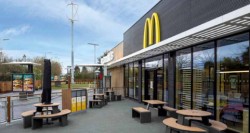Volumetric modular provider Algeco was part of the team that recently completed the UK’s first net zero restaurant for McDonalds at Market Drayton, Shropshire.
The construction industry by nature is a heavy consumer of natural resources, and construction activities are directly responsible for around 10% of all UK emissions. What’s more, between 20% and 40% of the UK’s total carbon footprint comes from our built environment, with estimates differing depending on whether or not they include the energy used within buildings.
Clearly, the industry has work to do to improve its green credentials and contribute to the UK’s drive towards net zero. Algeco, manufacturer and supplier of flexible, modular buildings for over 50 years is part of the innovative approach to carbon reeduction. All of the company’s building components are designed and fabricated offsite, before being transported to the construction site for assembly.
This approach has numerous benefits over traditional methods, offering a faster, greener way to deliver high quality new buildings, and maximising efficiencies at every level. The modules are fully recyclable and reusable, making them a much more environmentally friendly than traditionally constructed buildings. Green options such as solar panels and smart energy management solutions can be specified and included as part of the build.
UK’s First Net Zero Restaurant
McDonald’s in Market Drayton, Shropshire, is a wind turbine and solar panel-powered restaurant which will produce as much energy as it uses over the course of a year. It has been verified as net zero using the UK Green Building Council's (UKGBC) net zero carbon buildings framework. From the project outset, McDonald’s made it clear that its requirements included achieving a net zero build with minimal impact on the environment. Algeco’s innovative, turnkey solution included a kitchen, dining area, servery, toilets, offices and storage, as well as a car park and an external landscaped area. The building itself was 80% completed in the company’s factory in East Yorkshire before being transported to site, minimising waste and maximising quality control, efficiency and speed of construction.
The modules are constructed using a steel-framed system, a 100% recyclable material sourced from a UK supplier with certified Environmental Policy Declarations. The lightweight nature of the steel frame modules reduced the need for carbon intensive foundations. These were done at the same time as the modules were manufactured which reduced the overall build time by around half compared to an on-site build.
Once on-site, the modules were connected to services and underwent a final fit-out, ready for handover. The project comprised a number of small, incremental improvements which combined to make a huge difference in overall energy performance and environmental impact. For example, the building utilises responsibly sourced and recycled materials throughout. Other sustainable features include sheep's wool insulation instead of fibreglass: cladding, ceiling, floor and wall tiles made from recycled plastic; a rainwater harvesting system; wind turbine electricity generation and photovoltaic car park lighting complete with battery backup.
The kitchen incorporates a heat exchange that feeds into the dining area. All the Algeco offsite modules are designed to have a service life of at least 60 years, and the restaurant itself has been designed to allow for relocation, reconfiguration or recycling, depending on McDonald’s future requirements. Graham Stevenson, Construction Manager at Algeco, said: “This is a landmark project for McDonald’s, Algeco and the building industry as a whole. Achieving a net zero carbon build confirms that the ambitious targets set for the built environment are achievable using our modular and offsite solutions.” McDonald's spokeswoman Beth Hart added: “We've already started to roll out some of these innovations to other restaurants, but what is exciting about Market Drayton is the fact it will act as a blueprint for our future new builds. We believe that our food needs to be served in restaurants that are sustainable for the future. Market Drayton is a big step towards making that a reality.”
In the coming years, the UK construction industry will play a critical role in transitioning to a low carbon economy. The McDonald’s net zero build is an incredible example of what can be achieved, and the Algeco approach at Market Drayton opens up the possibility of a more sustainable solution for leisure and retail businesses as they look for ways of meeting their new zero commitments. For McDonald’s, Market Drayton sets out a route for all their restaurants being net zero in use by 2030. By opening the UK’s first net-zero carbon restaurant, McDonald’s has introduced cutting-edge innovations, the most successful of which will be rolled out in McDonald’s restaurants nationwide.
For more information on McDonald’s Market Drayton carbon net-zero build visit: www.algeco.co.uk/news/algeco-serves-carbon-net-zero-build-mcdonalds www.algeco.co.uk/permanent









